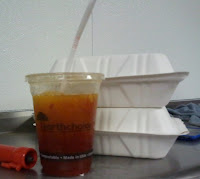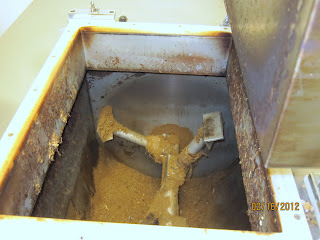 |
| Aviva - at left is pulper and square part on right, dehydrator |
Have I mentioned that I love my job? I got to go on a couple cool tours this week to check out ways to reduce organic waste. I know - who wouldn't love looking at people's left over food?
A group of us at the Department of Natural Resources reviewed results of a statewide "Waste Sort" - where people actually sift through trash being delivered to Iowa's landfills. We want to know what's in the trash. Garbage was sorted into many categories and weighed. What did we learn? Much of what's hitting landfills is organic - food waste. (Followed by cardboard - but that's a whole 'nother blog.)
To get ideas for ways to help Iowans cut organic waste we decided to investigate technologies being used to do just that.
I heard from my friend Rhonda at Metro Waste Authority (MWA), the agency in charge of the landfill and all things waste related in the Polk County area, about technologies a couple Des Moines insurance companies are using to reduce their reliance on landfilling of food waste. This week, planets aligned (thanks to Rhonda's persistence) and tours were scheduled to see kitchens at Aviva USA and Wellmark Blue Cross and Blue Shield.
Monday, my supervisor Jen, and co-workers Scott and Matt headed out west past Jordan Creek Mall to the Aviva, which opened in the fall of 2010. We met Rhonda there along with her co-worker Mary, who does environmental education for MWA. Even the foyer of the Aviva building is impressive! We provided our names for visitor passes - just to get past security. We met Tom Dengler - who works for Eurest Dining Services and proceeded to the spacious Aviva cafeteria.
 |
| Tom explains the Aviva system |
 |
| compostable cup and clamshell |
The pulper is similar to a garbage disposal - mashing food waste up with sharp hammers. Compostable containers with flatware may also go into the system. Water is piped into the mush to help mash it. Instead of flushing it down the drain, it then goes into a big sieve, where the water is then pushed back out of it. This process reduces volume 8:1.
Next, this lovely pile of dampish organics (300 pounds/week) is put into a dehydrator for 18 hours. There the stuff is stirred and cooked until it's reduced another 90% and has virtually no smell. The resulting product looks similar to wood shavings and is sent to MWA's yard waste facility to be composted. A whole week's worth of Aviva's organics turns into one tote of organic shavings. Remarkable!
Thursday we had the opportunity to see very similar technology - a pulper and dehydrator, at the gorgeous Wellmark , also built in 2010, in downtown Des Moines. This is a LEED Platinum facility - which means is was built in an environmentally friendly manner, set up to conserve energy. The place looks like a 4-Star hotel too!
 |
| Jen and Geri from MWA with Matt behind talk to Dee and Tom |
Tom Leon and Dee Keul showed us around at Wellmark. Guckenheimer Enterprises Inc. is the foodservice management company operating the cafeteria in Des Moines. I understand that Guckenheimer takes pride in preparing fresh meals, and Wellmark - in the health insurance industry - takes great pride in their commitment to health. Even vending machines are "healthy".
 |
| choose a healthy snack! |
 |
| cafeteria - that's Rhonda at right |
 |
| pulp |
 |
| dehydrated material |
 |
| reusable containers |
Neither Aviva nor Wellmark had information readily available on how much energy the equipment uses. Comparison information - before using the system to after wasn't available either since they both are in brand new buildings. I'll need more info to help evaluate whether or not this type of technology might help others. Wellmark and Aviva seem very happy with how things are working out for them.
These field trips were a lot like school field trips of my youth - interesting, informative and they got me out of the office. My job is fun. (most of the time) And now I can share this information with others - like you!


2 comments:
Post a Comment